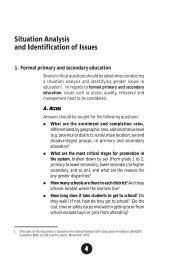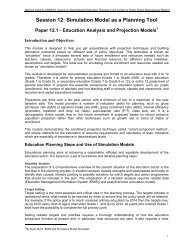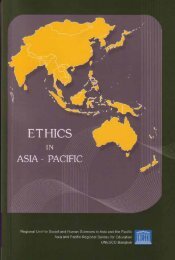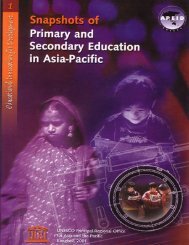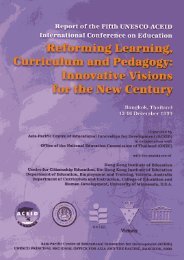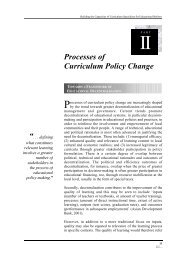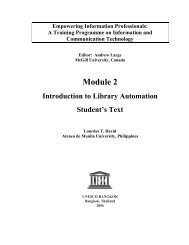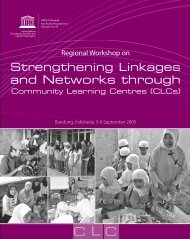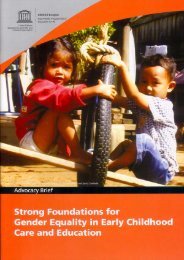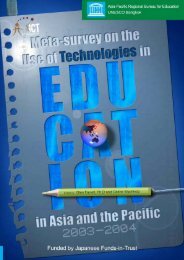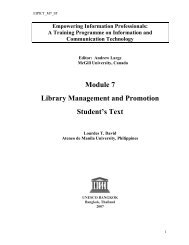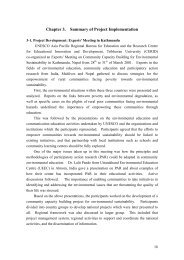Statistics on Cultural Industries - International Trade Centre
Statistics on Cultural Industries - International Trade Centre
Statistics on Cultural Industries - International Trade Centre
- No tags were found...
Create successful ePaper yourself
Turn your PDF publications into a flip-book with our unique Google optimized e-Paper software.
The joint operati<strong>on</strong> between the nati<strong>on</strong>al and internati<strong>on</strong>al project teams is particularly importantas the project is expected to create the basis for the development of capacity specific to the culturalindustries. In a capacity building project of this kind, counterpart staff are expected to be involvedin the entire process of data development and should be competent in terms of the management,co-ordinati<strong>on</strong> and operati<strong>on</strong> of the intended regular (e.g. annual) data compilati<strong>on</strong>, processing, andpublicati<strong>on</strong> activities. The project aims to utilize existing structures and human resources withinthe relevant departments and instituti<strong>on</strong>s as far as possible to support this capacity building.Chart 1 describes the relati<strong>on</strong>ship between the various agencies in the implementati<strong>on</strong> of thenati<strong>on</strong>al data projects. The precise implementati<strong>on</strong> arrangements will take cognizance of theneed to direct capacity building at the NSO resp<strong>on</strong>sible for regular surveys of manufacturingestablishments for the following reas<strong>on</strong>s: (i) to avoid duplicati<strong>on</strong> of establishment surveys, (ii)because line ministries do not have capacity for field enumerati<strong>on</strong> for establishment surveys/censuses, (iii) NSO is familiar with internati<strong>on</strong>al statistical standards and thus, internati<strong>on</strong>al datacomparability, and (iv) such capacity building would be the easiest to achieve at NSO as it would<strong>on</strong>ly entail the creati<strong>on</strong> of a sub-programme to the existing programme for industrial statisticsoperati<strong>on</strong>.8.3 Technical Co-operati<strong>on</strong>The Framework for <str<strong>on</strong>g>Statistics</str<strong>on</strong>g> <strong>on</strong> <strong>Cultural</strong> <strong>Industries</strong> is the outcome of research undertaken bythe UN Interagency Technical Working Group <strong>on</strong> <strong>Cultural</strong> <strong>Industries</strong> <str<strong>on</strong>g>Statistics</str<strong>on</strong>g>, an informal workinggroup c<strong>on</strong>vened by UNESCO comprising, besides UNESCO, members from various internati<strong>on</strong>alorganizati<strong>on</strong>s including UIS, UNIDO, WIPO, and UNDP. Experts in the field are co-opted by theworking group for individual meetings.<str<strong>on</strong>g>Statistics</str<strong>on</strong>g> <strong>on</strong> <strong>Cultural</strong> <strong>Industries</strong>Framework for the Elaborati<strong>on</strong> of Nati<strong>on</strong>al Data Capacity Building ProjectsThe formulati<strong>on</strong> of the project proposal has in particular benefited from WIPO’s c<strong>on</strong>siderableexperience and expertise in the area of intellectual property protecti<strong>on</strong>, and from UNIDO’sexperience with small and medium-sized enterprise development. In additi<strong>on</strong>, the group has beenable to draw <strong>on</strong> the experience of the statistical offices of UIS and UNIDO, as well as the advice ofthe <strong>Centre</strong> for <strong>Cultural</strong> Policy Research at the University of H<strong>on</strong>g K<strong>on</strong>g (HKU).In the c<strong>on</strong>text of the Jodhpur Initiatives programme, the close technical co-operati<strong>on</strong> of thec<strong>on</strong>cerned internati<strong>on</strong>al technical agencies will be an important objective to ensure that the datagenerated by the nati<strong>on</strong>al projects will indeed be generally applicable and in line with internati<strong>on</strong>alstatistical standards.The involvement of the UNESCO-c<strong>on</strong>vened UN Interagency Technical Working Group <strong>on</strong> <strong>Cultural</strong><strong>Industries</strong> <str<strong>on</strong>g>Statistics</str<strong>on</strong>g> will ensure that the overall strategy to improve transparency and governanceremains as a guiding principle for the implementati<strong>on</strong> of nati<strong>on</strong>al projects. The c<strong>on</strong>tinuedmethodological work of the technical working group will include the review of the progress madeby nati<strong>on</strong>al cultural industries data projects and ensure that the experience will be shared withother nati<strong>on</strong>al projects. Their involvement will further ensure that these experiences are broughtforward as input to the discussi<strong>on</strong> of internati<strong>on</strong>al statistical standards and indicators for the areaof cultural industries.While the nati<strong>on</strong>al data projects will test the methodology outlined in the Framework forNati<strong>on</strong>al Capacity Building Projects for <str<strong>on</strong>g>Statistics</str<strong>on</strong>g> <strong>on</strong> <strong>Cultural</strong> <strong>Industries</strong>, the overall resp<strong>on</strong>sibility forthe development of a methodology must rest with the Internati<strong>on</strong>al Advisory Board which will52



